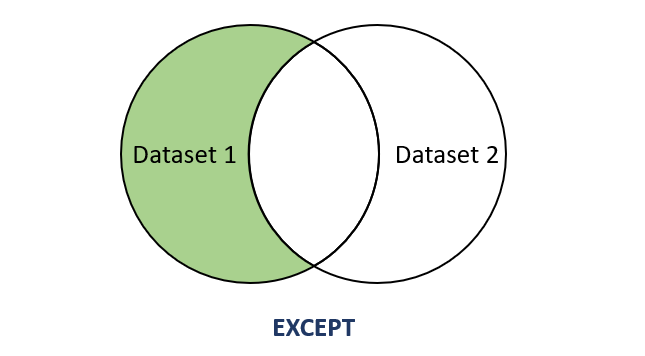SQL - EXCEPT Clause
The SQL EXCEPT clause is used to compare the result-sets of two or more SQL SELECT statements. It returns all records from the first result-set that do not appear in the second result-set.
While using EXCEPT clause, the following criteria must be satisfied:
- Number of columns in each SELECT statement should equal.
- Datatype of columns in each SELECT statement should match.
- Order of columns in each SELECT statement should match.

Syntax
The syntax for using EXCEPT clause is given below:
SELECT column1, column2, ... FROM table1 EXCEPT [ALL] SELECT column1, column2, ... FROM table2
Example:
Consider database tables called Product and Inventory with the following records:
Table 1: Product table
| Name | Brand | Price | Quantity |
|---|---|---|---|
| Apple | Delicious | 1.5 | 40 |
| Apple | Harvest | 1.6 | 50 |
| Orange | Delicious | 2.0 | 40 |
| Orange | Harvest | 1.9 | 50 |
| Watermelon | LocalFarm | 4.0 | 50 |
| Mango | LocalFarm | 3.5 | 60 |
Table 2: Inventory table
| Name | Brand | Price | Quantity |
|---|---|---|---|
| Apple | Delicious | 1.5 | 20 |
| Orange | LocalFarm | 2.0 | 40 |
| Watermelon | LocalFarm | 4.0 | 20 |
-
Using EXCEPT clause: To get the records of Name column which are not present in both record-sets, the following SQL code can be used:
SELECT Name FROM Product EXCEPT SELECT Name FROM Inventory ORDER BY Name;
This will produce the result as shown below:
Name Mango -
Using EXCEPT clause with WHERE clause: To fetch the records of Name column which are not present in both record-sets with the specified condition, the following SQL code can be used:
SELECT Name FROM Product EXCEPT SELECT Name FROM Inventory WHERE Quantity < 30 ORDER BY Name;
This will produce the following result:
Name Mango Orange -
Using EXCEPT clause with multiple columns: To fetch the records of Name and Brand columns which are not present in both record-sets, the following SQL code can be used:
SELECT Name, Brand FROM Product EXCEPT SELECT Name, Brand FROM Inventory ORDER BY Name;
This will produce the following result:
Name Brand Apple Harvest Mango LocalFarm Orange Delicious Orange Harvest


